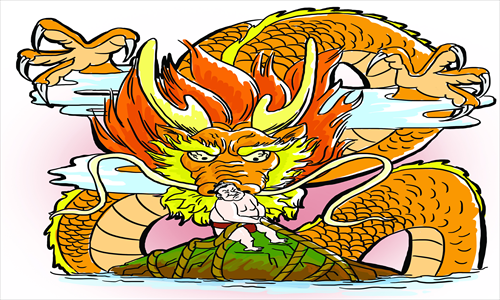New measures over Diaoyu just start

The Chinese government announced Monday the official baseline for the territorial waters of the Diaoyu Islands and then covered the Diaoyu Islands in domestic weather forecasts Tuesday. These moves were a response to Japan's aim of "nationalizing" the Diaoyu Islands. This indicates that the dispute has reached the stage of official confrontation.
Announcing the baseline of territorial waters is the prerequisite to determine sea areas under national jurisdiction. In this way, we can make sure that 12 nautical miles outside the baseline of the territorial waters are considered our peripheral areas under China's sovereignty.
In accordance with China's laws, we can deny access to any foreign aircrafts, warships and individuals except innocuous foreign civilian vessels in these waters. Otherwise, it is an infringement of our territory, and we are entitled to resort to our domestic law for adjudication.
In addition, we can set an exclusive economic zone within 200 nautical miles of the baseline and continental shelf for no more than 350 nautical miles according to the Law on the Exclusive Economic Zone and the Continental Shelf. In these waters, foreign countries are forbidden to fish, develop oil and gas resources, carry out scientific exploration or build artificial facilities without our permission. As for the waters that overlap with our neighbors, we can determine the maritime boundary of the two sides through negotiations and consultations.
In fact, for disputed islands like the Diaoyu Islands, we need to consider both political and diplomatic factors as well as legal ones. If the territory is linked with no disputes, the country can freely exercise sovereignty, such as legislation, immigration, and construction of various facilities and even garrison. However, it could escalate to war if the above actions were taken over a disputed territory. Therefore, the two conflicting parties must remain restrained on this issue.
The reason why the situation of the Diaoyu Islands has come to this point is that Japan always denies the dispute over the Diaoyu Islands. It exercises its "sovereignty" over the Diaoyu Islands without restriction. For instance, Japan has built a helipad on the islands, some Japanese officials have landed on the islands, and they now want to "nationalize" the Diaoyu Islands. In fact, China can also take actions like these. However, if China did the same, it would trigger a serious confrontation. Both sides should keep themselves 12 nautical miles away from the Diaoyu Islands and jointly develop the islands to work toward peace instead of crisis. Peace and stability will benefit people from both sides.
Based on the goal of maintaining regional stability, China deals with the Diaoyu Islands issue on the premise that the Diaoyu Islands are disputed areas. China maintains a restrained attitude to avoid possible escalation. However, Japan has betrayed China's trust. It mistakes it for weakness. It uses China's tolerance to enforce its de facto control of the Diaoyu Islands.
The Chinese people love peace. However, it is not one side's responsibility alone to maintain regional stability. China has really shown the utmost tolerance and patience toward Japan.
China's firm determination to safeguard sovereignty and territorial integrity has never changed. Indomitable spirit is the willpower of the nation. What we should do is to give Japan a dose of its own medicine. If Japan doesn't get its policy back on the rails, China need not exercise restraint on countermeasures such as dispatching officials to land on the islands, patrolling within 12 nautical miles of the islands, renting the islands to individuals or moving registered permanent residences to the Diaoyu Islands.
The author is a research fellow at the Chinese Naval Research Institute. opinion@globaltimes.com.cn